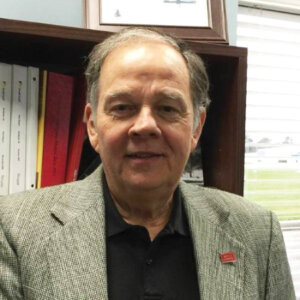
The scene is unexpected on Covington County’s Billie Blackmon Road.
As one drives the Andalusia thoroughfare, thick pine tree forests give way to a 79,000-square-foot warehouse — the MRO hangar at the South Alabama Regional Airport. Inside this maintenance, repair and overhaul facility, a machine shop, fabrication center and custom aircraft implements are in various stages of completion.
Also inside is Isolair Helicopter Systems Inc., as unique as the products it produces.
Owned and operated by Michael and Terry Powell, Isolair does not work on helicopters per se. The company makes systems in accordance with FAA approval. And they do so all over the planet from its world headquarters in Andalusia.
Isolair shares the mammoth hangar with McDermott Aviation, an Australia-based company with North American headquarters in Covington County. The two owner-business neighbors are also pals.
“I have been friends with John McDermott for almost 30 years,” Michael Powell says of the man who told him about Andalusia and Covington County’s push to aviation. “Last year he and I were on a cruise in the Adriatic Sea when John started talking about this building,” Isolair’s owner adds. “I decided to have a look,” and he did, in July 2022.
Isolair is a 40-year-old company that Portland, Oregon, resident, Powell purchased in 1998. “But I was not happy in Oregon,” he says, citing high taxes and other factors. “I wanted out.” He visited the Covington County site and liked what he saw, and with Covington County, the feeling was mutual.

“My first experience with Isolair was an unsolicited email,” recalls Rick Clifton, president and CEO of the Covington County Economic Development Commission. “My inbox beeped with a message heading, ‘Business Opportunity for South Alabama.’” The message was from Isolair.
Responding to the email, Clifton asked Powell if he wanted to expand his business down here. Powell replied, “No. I want to move my business down here.”
The Oregon to Alabama transition started the following October. During the 2022 Christmas holidays, Terry moved down and assumed her role with the company. Terry is the CEO. Michael is the president.
Michael Powell concedes, “I knew nothing about Alabama when we came here but I learned to appreciate it.” He notes there were startup issues. Some are still in progress.
“At times, we have issues finding workers and vendors,” says the company president. But that holds true everywhere else, too. “Good welders are always in demand,” he continues, as evident by Isolair’s “Help Wanted” sign posted on a nearby road.

Isolair’s product line turns helicopters into flying workhorses. Like all businesses in the helicopter accessories industry, Isolair has required FAA approval (type certificates) to work on specific aircraft models. “There is little room to deviate from our FAA permit,” he says. “Once permitted by the FAA, you cannot modify the system.”
Though the company designs, fabricates and tests the equipment, employees do not install it on the helicopter, which would be against FAA restrictions. Instead, the system is shipped to the owner, who has a separate set of FAA regulations, governing the product’s application to the aircraft.
“Installation requires a whole different level of approval, and I do not want to be involved in that,” says Michael Powell. That goes for flying, too. “I have no desire to be a pilot,” he adds, “but I have flown in helicopters all over the world.”
From Andalusia, completed helicopter systems are shipped to customers throughout the company’s sales territory — Earth.
“For example, right now I am exchanging emails with a customer in India,” Powell says, pointing at his computer screen. He explains that Indian rice paddies are coming into harvest and need aerial spraying.
August through September are often slower months. “Usually during those times, countries are either already spraying crops or already fighting fires. Either way, it is too late for us to be involved. This time of year (August), we build parts and components to stock our shelves.”
As one might think, customer satisfaction is critical when purchasing an aircraft accessory with a price tag above $150,000 to be added to a chopper with its own $4 million price tag.
Therefore, every piece of equipment to be attached to the belly of the beast with rotating blades receives rigorous testing before installation. Pumps, valves, piping, electronics, computers — even nuts and bolts — all must pass examination. Products are pushed through simulations, indicative of conditions it is designed for.
If it is built by Isolair, it is tested by Isolair before going airborne.
The commonality of all helicopter parts and accessories is weight, and the lack thereof. “We use a lot of aluminum,” says Michael Powell, conducting an impromptu tour of the parts room, as we examine piping drilled with calibrated holes specifically for crop spraying. “In the helicopter application business, the lighter it is the better it is.” Heavy is the enemy.
Major product lines include equipment for firefighting, forestry and agriculture. To date, more than 22 Isolair systems and other options are FAA approved and tailored to client needs. They include:
Firefighting
Attached to the underside of a helicopter, the “Eliminator” system dumps flame retardant chemicals, regulated by the pilot. Isolair’s firefighting systems are deployed in the U.S., Canada, Mexico, South America, Japan, Korea, Taiwan, Spain, France, Portugal, Italy and more. Powell notes that just as countries have specific growing seasons, many have fire seasons, which vary across the globe.
Agriculture
Isolair’s spray systems use pumps built in-house. Mounted boom spans can be rotated for desired nozzle position and sprays. Isolair’s “Innovator” series can spray pesticides, herbicides, fertilizers and the like on a swath covering 40 to 60 feet at 85 mph. Some models do more, others do less, depending on crop, soil and helicopter.
“Agriculture is a major part of our business,” Powell adds. “We do a lot of business in the U.S. Midwest during corn season.”
Forestry
One of Isolair’s first product lines was forestry protection and growth. “The Firefly,” “Broadcaster” and “Dryslinger” models offer an array of units dispersing fertilizer and seed or carrying payloads.

As for the future, “business aviation needs change,” Powell explains. “Businesses add helicopters to their aircraft fleet. Older helicopters are replaced by new models.” They need new accessories.
“We have done a lot of mosquito control work in Florida,” the Isolair president recalls. “But on occasion, bugs build a tolerance to pesticides. New methods are deployed, often requiring new equipment and/or different helicopters.” Isolair hopes to fill those needs.
Regardless of product line and applications, Covington County appreciates having the new business in its municipal portfolio. “When Isolair relocated to Andalusia, we thought it would create about 7 jobs,” recalls Clifton. “Turns out, Isolair combined with McDermott Aviation added 25-plus jobs.”
He adds, “And these are skilled positions — mechanics, designers, aircraft welders and more.”
Clifton also notes, “The Powell’s are great people, too. They came from Oregon knowing very little about Alabama. They bought a house here, bank locally and participate in local events. They have had a great impact on our community.”
Covington County is striving to build its aviation and aerospace sector — with success. In addition to the MRO Hangar, recent expansions to the Alabama Aviation College – Andalusia Campus, the South Alabama Regional Airport and nearby Fort Novosel (formerly Fort Rucker) are creating a new workforce. Isolair is the newest member of that cluster.
Emmett Burnett and Jay Hare are freelance contributors to Business Alabama. Burnett is based in Satsuma and Hare in Dothan.
This article appears in the October 2023 issue of Business Alabama.



